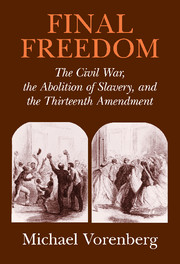Book contents
- Frontmatter
- Contents
- List of Illustrations
- Acknowledgments
- List of Abbreviations
- Introduction
- 1 Slavery's Constitution
- 2 Freedom's Constitution
- 3 Facing Freedom
- 4 Debating Freedom
- 5 The Key Note of Freedom
- 6 The War within a War: Emancipation and the Election of 1864
- 7 A King's Cure
- 8 The Contested Legacy of Constitutional Freedom
- Appendix: Votes on Antislavery Amendment
- Bibliography
- Index
2 - Freedom's Constitution
Published online by Cambridge University Press: 01 September 2009
- Frontmatter
- Contents
- List of Illustrations
- Acknowledgments
- List of Abbreviations
- Introduction
- 1 Slavery's Constitution
- 2 Freedom's Constitution
- 3 Facing Freedom
- 4 Debating Freedom
- 5 The Key Note of Freedom
- 6 The War within a War: Emancipation and the Election of 1864
- 7 A King's Cure
- 8 The Contested Legacy of Constitutional Freedom
- Appendix: Votes on Antislavery Amendment
- Bibliography
- Index
Summary
The Gettysburg Address offered only the promise of freedom, not a specific plan of emancipation. After the address, in the winter of 1863–64, Lincoln and the new Thirty-eighth Congress finally began to craft legislation that would secure black freedom in the reconstructed Union. Because the antislavery constitutional amendment was ultimately adopted, we naturally assume that Civil War–era lawmakers always had the amendment in mind as the obvious complement to the Emancipation Proclamation. But, in fact, the amendment was not part of a prearranged agenda. Instead, it was born from a complex tangle of party politics, popular antislavery fervor, and constitutional theory. And far from being an obvious supplement to the proclamation, the amendment represented, for many northerners, a critique of the president's emancipation program.
The Popular Origins of Universal Emancipation
As the new Congress prepared to convene, northerners were far from united on a single plan of emancipation, but they seemed more interested than ever in seeing slavery somehow abolished. In the Midwest, a Republican preacher who had complained in the fall of 1862 that “nobody wants any lectures on the slavery question” observed that audiences now clamored for antislavery speakers, especially those recently converted to the cause. Antislavery whisperings could even be heard from some traditionally antiabolitionist newspapers like the Pittsburgh Post. When the Post, a Democratic paper, reported that “the future peace of this now bleeding and distracted country, requires the total extinction of slavery among us,” the Republican Indianapolis Daily Journal was quick to respond: “that sounds very like ‘Abolitionism’ to our ears.”
- Type
- Chapter
- Information
- Final FreedomThe Civil War, the Abolition of Slavery, and the Thirteenth Amendment, pp. 36 - 60Publisher: Cambridge University PressPrint publication year: 2001



